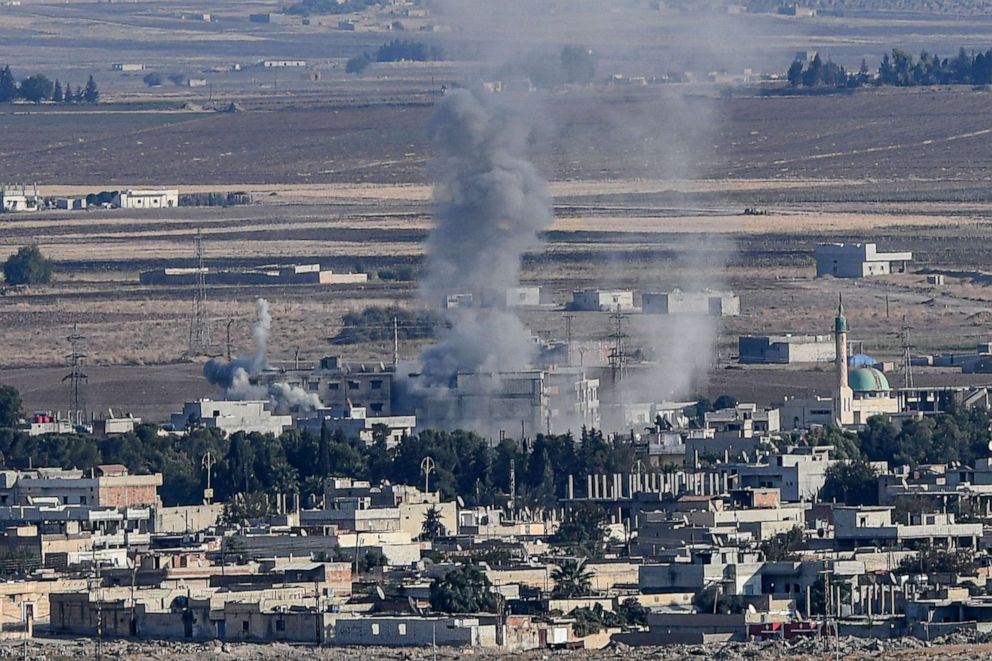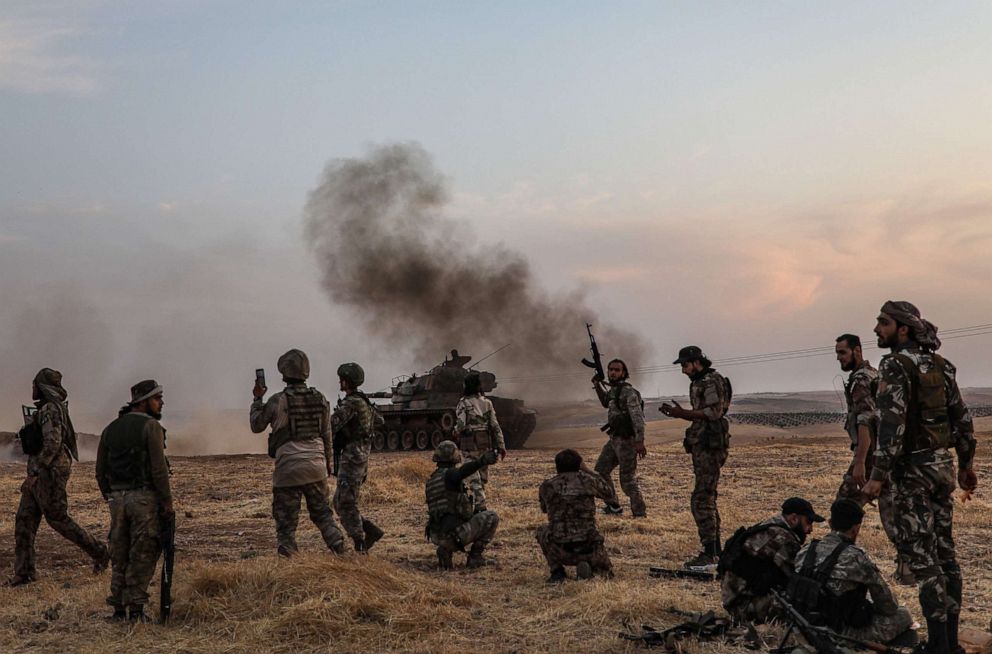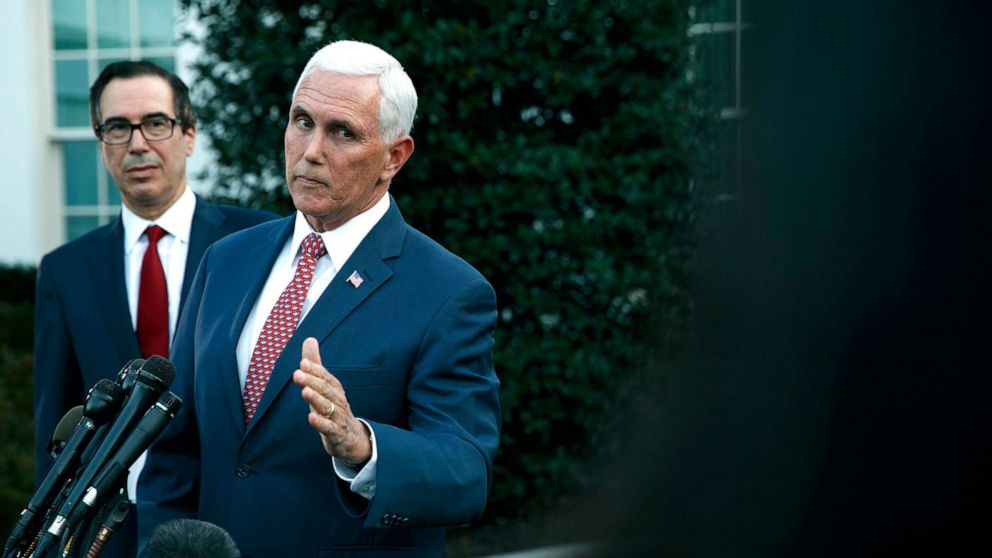Vice President Mike Pence to head delegation to Turkey for ceasefire talks
The U.S. delegation President Donald Trump is sending to try to negotiate a ceasefire and settlement between Turkey and U.S.-backed Syrian Kurdish forces will depart in the next 24 hours, a senior administration official said Tuesday.
The trip was welcomed by top Senate Republican Mitch McConnell, but the idea of talks already has been rejected by Turkey, where President Recep Tayyip Erdogan condemned any mediation between his government and the Syrian Kurdish forces his nation considers terrorists.
Erdogan said late Tuesday that he rejected a demand by his Trump regarding Turkey's ongoing anti-terror operation in northern Syria.
"Mr. President [Trump] demanded that we declare a ceasefire. We never will," Erdogan said. "No ceasefire is possible in Syria until the People's Protection Units (YPG) evacuates the border area. I told him that Turkey will not negotiate with terrorists."
The White House delegation to Turkey will include Vice President Mike Pence, Secretary of State Mike Pompeo, National Security Adviser Robert O'Brien and special envoy for Syria Jim Jeffrey, according to the White House, which announced Pence will meet with Erdogan.
While McConnell did not directly call out the president during a speech on the Senate floor, he blasted Trump's decision to withdraw all U.S. forces from northeastern Syria -- a sign of the fierce blowback even within Trump's own party that has only grown since his decision to pull back troops ahead of the Turkish operation against the Kurds.
"Leaving the field now would mean leaving the door wide open for a resurgence of this dangerous force [ISIS] and a new iteration of the Islamic State, creating a power vacuum begging for the meddling influence of Russia, leaving northeastern Syria wide open for Iran to extend its reach unimpeded all the way from Tehran to the doorstep of our friends in Israel, and destroying the leverage we currently have to compel Bashar al Assad to stop his slaughter of the Syrian people and negotiate an end to this terrible conflict and humanitarian catastrophe," McConnell said.

McConnell argued that the U.S. deploying troops to Syria and Afghanistan did not make America the world's policeman, but showed a "prudent and responsible world power that stands up for our security and freedom of others." But moments earlier across Washington, Trump said U.S. forces were "policing" and needed to come home: "We want to bring our soldiers back home after so many years. ... They are policing, they are not a police force."
Three days after a fateful phone call between Trump and Erdogan, Turkey launched an operation last Wednesday against the Syrian Democratic Forces, or SDF, the majority-Kurdish, U.S.-backed troops that fought alongside against ISIS.
Before the offensive began, Trump announced he was withdrawing two attachments of U.S. troops in the area -- a move critics have blasted as giving a green light to Erdogan, but which the senior administration official defended as a "tactical" decision to keep them out of the fray.
"We have absolutely no -- I want to repeat here -- we have no decision at any level ever taken by the United States to provide military protection to the SDF, nor did we ever by any authoritative source -- underline 'authoritative source' -- tell the SDF that we would protect them militarily. We told them many times that we would do everything in our power short of military action to try to prevail upon the Turks not to come in," the official told reporters during a briefing.
"We failed in our mission to deter Turkey from coming in," they added, but officials rejected the categorization that the U.S. abandoned its Kurdish partner forces.
McConnell said U.S. support for local Kurdish forces must continue, warning the Senate had a veto-proof majority earlier this year when it passed a resolution condemning Trump's push for a total withdrawal. But Congress has little power to keep troops there when the commander-in-chief orders them out. Sen. Lindsey Graham, R-S.C., and Chris Van Hollen, D-Md., will instead introduce legislation Thursday to increase sanctions on Turkey, Graham said Tuesday.
In the days since the offensive began, the administration has implemented its own sanctions on Turkey, starting with the defense, energy and interior ministers and the defense and energy ministries Monday. It's a stunning move against a NATO ally that analysts warn will further unravel the U.S.-Turkish relationship.
But Turkey has remained defiant. Fahrettin Altun, a senior communications adviser to Erdogan, told AFP news agency Tuesday, "We will continue to combat all terrorist groups, including Daesh, whether or not the world agrees to support our efforts," using an Arabic name for ISIS.
Turkey is still "mulling over the impact of the sanctions and other action that we communicated to them," the official said, but the administration hopes now that they will be open to conversations to halt their operations.
McConnell urged Turkey to "listen carefully to the anger from Washington" when Pence and his delegation arrive later this week.
"Our first goal is to basically have a heart-to-heart talk with the Turks. ... We're very concerned about their actions and the threat that they've presented to peace, security, stability and the territorial integrity of Syria," the official said.
"We are in high gear on our diplomacy, led by the president," the official added, noting that Trump talked to Erdogan and SDF General Mazloum yesterday "to press for a ceasefire."

The Turks already have said won't negotiate with the Syrian Kurdish forces because it considers them terrorists aligned with Kurdish separatists in Turkey.
The U.S. and Turkey also already had an agreement reached in the months since ISIS's caliphate fell to secure that area, prevent a resurgence of ISIS and address Turkey's security concerns. But Turkey said it didn't work for them and tore it up, invading the Kurdish-held territory instead.
When asked by ABC News what the Pence delegation can do differently this time, the official said, "The president has directed us to do this. ... We are very aware that the Turks entered into an agreement with us and they then decided that they would pull out of that agreement, and we're very concerned about that happening again."
As Russian and Syrian forces of strongman Assad took control of the key city Manbij Tuesday, they were coordinating with the U.S., according to the official, using an existing deconfliction line that has helped to reduce risk between Russian and U.S. troops for years now. All U.S. forces are now out of Manbij as the "orderly, deliberate, responsible ground withdrawal" continues, the official said.
The U.S. also is concerned about the human rights violations by Turkish-sponsored opposition groups, which the U.S. holds Turkey responsible for, the official added, saying Turkey could have used its own forces instead and calling these opposition groups "thugs and bandits and pirates that should be wiped off the face of the Earth."




